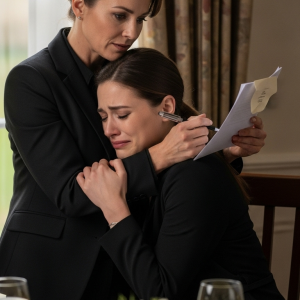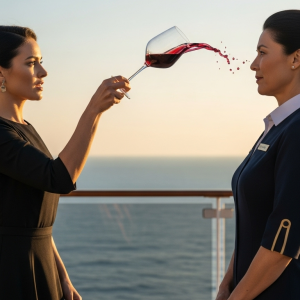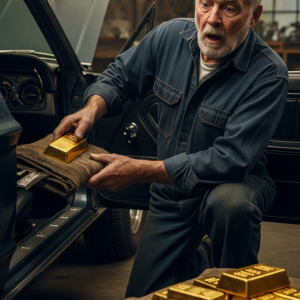The sun over Crescent Beach was a relentless, molten gold, bleaching the sand to a pale, shimmering white. From her elevated throne, the lifeguard tower, Chloe watched the world unfold in its predictable summer rhythm. College in the fall felt a world away; for now, her universe was this strip of coast, the laughter of children, and the steady, hypnotic crash of waves.
And Mr. Peterson. Every day, like a tide-bound clock, he would appear at 9 a.m. sharp. He’d walk with the stiff, deliberate gait of a man who had commanded ships, his back a ramrod of naval discipline, even as age stooped his shoulders. He’d settle onto the same wooden bench, the one with the best view of the horizon, and simply watch.
For the first week, they exchanged nothing more than a polite nod. The second week, Chloe started a tentative “Good morning,” which was returned with a gravelly, “And to you, miss.” By the third week, she brought him a cold bottle of water, an offering against the oppressive heat. He thanked her, and for the first time, she saw a genuine smile light up his weathered face.
Their friendship grew in the quiet spaces between the clamor of the beach. She learned he was a retired Navy captain, a widower for fifteen years. He learned she was studying marine biology, her head full of dreams about coral reefs and deep-sea exploration. He never spoke of family, and she never asked. There was a solitude about him that felt sacred, a quiet grief that clung to him like the scent of salt.
One sweltering afternoon, during a lull in the beach traffic, Chloe found him staring at his hands, turning a small, pale object over and over in his palm. His gaze was distant, fixed on a point somewhere beyond the horizon, a place sixty years in the past.
“What’s that, Mr. Peterson?” she asked softly, leaning against the railing of his bench.
He started, as if pulled from a trance. He opened his hand. Resting in the center of his wrinkled palm was half of a sand dollar, its edges worn smooth by time and touch. It was a fragile, imperfect semi-circle.
“A memory,” he said, his voice thick with an emotion she had never heard from him before. “The better half of a promise.” He then began to speak, and the story spilled out of him, a torrent of memory held back for decades. He told her about Eleanor, a girl with a laugh that rivaled the music of the boardwalk and eyes the color of the summer sky.
He told her of their last day on this very beach, sixty years ago. He was just a boy then, barely eighteen, his new naval uniform crisp and unfamiliar. The world was on the brink of conflict in a place called Korea, a name that meant nothing to them except that it was taking him away. They found a perfect sand dollar, and with a shared, youthful solemnity, they broke it in two.
“She kept one half, I kept the other,” he whispered, his thumb tracing the delicate star pattern on his piece. “A promise. That no matter what ocean was between us, we would always be connected. That I would come back and we would make it whole again.”
Chloe listened, her heart aching for the young man he had been. “What happened?”
Mr. Peterson’s face clouded over. He looked out at the sea, his jaw tight. “The war happened. Letters stopped. Time… time is a cruel current, young lady. It pulls everything apart.” He closed his hand around the fragile piece of his past, the story finished.
The story haunted Chloe for days. She’d watch Mr. Peterson on his bench and see not just an old man, but a heartbroken boy, forever waiting for a ship that would never return. The injustice of it, of a love so pure being washed away by war and time, felt fundamentally wrong.
One afternoon, she approached him, her own heart pounding with a nervous idea. “Mr. Peterson,” she began, “have you ever thought about… trying to find her? With the internet, you can find anyone.”
He gave her a sad, weary smile, the kind reserved for the well-intentioned but naive. “It’s too late for that, kiddo. An entire ocean of time has washed between us now. She’s likely forgotten me, moved on, lived a full life. I’m just a ghost from a different world.”
“But what if she hasn’t?” Chloe pressed, a fierce conviction rising in her. “What if she’s out there, holding the other half?”
His silence was her answer. The resignation in his eyes was the spark. It was no longer just a sad story; it was a mission. That day, Chloe decided she would not let his story end this way. She would prove him wrong. She would show him that some things, some promises, were stronger than the ocean of time.
She waited until the late afternoon light turned the beach to gold. She walked over to Mr. Peterson, her smartphone already in her hand. “Sir,” she said, her voice gentle but firm. “Would you be willing to tell your story one more time? But this time, for the whole world to hear.”

He looked at the small black rectangle in her hand, then at her earnest, hopeful face. He saw the same fire, the same refusal to surrender, that he once had. With a slow, tired nod, he agreed.
Chloe wasn’t a filmmaker, but she had a storyteller’s heart. She didn’t film his face directly. Instead, she filmed his hands, the weathered knuckles and the prominent veins, as he held the half-sand dollar. She filmed the endless expanse of the ocean he stared at every single day.
Then, she added her own voice, a soft, respectful narration over the images. She told the story of a young sailor and a girl with eyes like the summer sky. She spoke of their promise on the eve of his departure for the Korean War. She didn’t embellish; she just let the simple, heartbreaking truth of it fill the air.
She uploaded the 60-second video to TikTok and Instagram Reels. She chose a simple, instrumental piano track to play in the background. For the caption, she wrote: “For 60 years, he’s waited. Let’s help him find Eleanor.” And then, she added a hashtag, a beacon in the vast digital sea: #FindEleanor.
She put her phone away and went back to work, her stomach churning with a mixture of hope and anxiety. For an hour, nothing happened. Then, her phone buzzed. A single comment: “This is beautiful. Sharing.” Then another buzz. And another.
Back in her tower, under the fading light, Chloe watched the numbers climb. Ten thousand views. Fifty thousand. The comments poured in, a flood of empathy and support from strangers across the globe. “My grandfather fought in that war.” “I’m crying.” “Come on, internet, do your thing!” The video was no longer hers; it belonged to the world now.
The story had become a message in a bottle, and she had just tossed it into the biggest ocean in human history. She stayed up late, her eyes glued to the screen, watching the shares multiply, each one a small prayer sent out into the darkness, searching for a woman named Eleanor.
Miles away, in a quiet, sun-drenched living room filled with the scent of lavender and old books, a teenager named Sarah was scrolling idly through her phone. She was half-watching a movie with her grandmother, her mind drifting. She swiped past dance challenges and comedy skits, her thumb moving in a bored, hypnotic rhythm.
Then she stopped. A video of an old man’s hands, holding a broken sand dollar. A familiar story. A story she had heard a hundred times, her grandmother’s voice soft with memory. The story of a young sailor with a kind smile, a promise made on a beach, and a war that had stolen everything.
“No way,” she whispered, her eyes wide. She listened to the narrator’s voice, her heart starting to pound. The details were all there. The beach. The promise. The name. Eleanor.
She scrambled off the couch, nearly tripping over the rug. “Grandma! Grandma, you have to see this! Right now!”
Her grandmother, Eleanor, looked up from her knitting, startled. She was a woman of quiet grace, her hair a soft silver, but her eyes, even now, were the color of a summer sky. “Sarah, what is it? You’ll wake the neighbors.”
“Just watch,” Sarah insisted, kneeling beside her armchair and holding out the phone.
Eleanor watched the video. She saw the hands, the sand dollar, the ocean. As the narrator’s voice recounted the tale, her own hand flew to her mouth. A soft gasp escaped her lips. Her knitting fell from her lap. Sixty years collapsed into a single, heart-stopping moment. The face of the boy she had loved, the one she was told had perished in the cold waters off the Korean coast, flashed in her mind.
At that exact moment, Chloe’s phone buzzed with a different kind of notification. It wasn’t a comment or a like. It was a direct message. Her hands trembled as she opened it.
The message read: “I think I’m Eleanor’s granddaughter. My grandmother is sitting right next to me, crying. She says she never stopped waiting.”
Chloe’s breath hitched. Her eyes scanned the next line.
“She still has the other half.”
Attached was a photo. A picture of an old, delicate hand holding the other half of a sand dollar, its edges jagged, its surface yellowed with age. It was the missing piece.
A joyous, uncontainable shout erupted from Chloe’s lungs. She scrambled down the ladder of her tower, her feet hitting the sand with a thud. She ran. She ran along the water’s edge, past startled families and laughing children, her phone clutched in her hand like a holy relic.
She saw him on his bench, a lonely silhouette against the setting sun.
“MR. PETERSON!” she screamed, her voice raw with emotion. “MR. PETERSON, I FOUND HER! I FOUND ELEANOR!”
The news shattered the quiet solitude that had encased Arthur Peterson’s heart for six decades. The wall of grief, built brick by brick with each passing year, crumbled in an instant. The story came tumbling out, not just from Eleanor’s granddaughter, but from Eleanor herself, through tearful phone calls that bridged the sixty-year gap.
She had waited. She had written letters that were all returned, stamped with a final, brutal message: DECEASED. A mistaken identity, a clerical error in the chaos of war, had declared him lost at sea. She had mourned him, built a life on the hollow foundations of that grief, married a good man, raised a family, and eventually buried him too. But she had never, ever thrown away her half of the sand dollar.
And the most staggering revelation of all: she had been living just thirty miles down the coast for the past twenty years. They had been separated not by a continent, but by a short drive. A lifetime of loneliness, sustained by a simple, tragic mistake. The “destruction” was not of lives, but of that loneliness, of the false narrative that had governed both their lives for so long.
A reunion was planned for the following day, at sunset, on the very beach where the promise was first made. The news had spread through the online community that had championed their story. Local news crews had picked it up. A quiet, personal quest had become a public spectacle of hope, but Chloe, with the help of Eleanor’s family, shielded them from the worst of it. This moment was theirs, and theirs alone.
Arthur didn’t sleep that night. He sat in his small, neat apartment, the half-sand dollar on the table in front of him. He was a boy of eighteen again, terrified and hopeful, standing on the precipice of a future he thought had been stolen from him forever.
The next day, the air at Crescent Beach was thick with anticipation. Chloe was there, not as a lifeguard, but as a friend, standing with Arthur. Eleanor’s family arrived first, a small, supportive crowd. Then, a car pulled up, and Sarah helped her grandmother out.
Eleanor stood for a moment, looking at the familiar stretch of sand. She was leaning on a cane, but she stood tall. Her eyes scanned the shoreline until they found him. Arthur. Standing by the old wooden bench.
Time seemed to slow down as they walked toward each other. No one spoke. The only sound was the cry of the gulls and the gentle sigh of the waves. They were no longer the vibrant teenagers who had said goodbye here, but the years of pain and longing fell away, leaving only the raw, undeniable connection that had survived a war, a lie, and a lifetime apart.
They stopped, a foot of sacred space between them. Arthur’s hand trembled as he held out his piece of the sand dollar. “I kept my promise,” he said, his voice a choked whisper. “I came back.”
With tears streaming down her face, Eleanor opened her own palm, revealing her half. “I never left,” she replied, her voice just as fragile.
Slowly, reverently, they brought the two halves together. They fit. A perfect, seamless whole. Sixty years of separation, mended in an instant.
They didn’t marry. Their time for that had passed. But they became inseparable. Every morning, Arthur would still go to the bench, but he was no longer alone. Eleanor would be there beside him, her hand resting gently on his. They would sit for hours, sometimes talking, sometimes in comfortable silence, two souls who had finally found their way back to their shared shore.
From her tower, Chloe would watch them. She saw not just two elderly people, but the living embodiment of a love that had refused to die. Her simple act of kindness, amplified by a world she barely understood, had not just found a missing person. It had healed a wound that was over half a century old. It had made a promise whole again.




